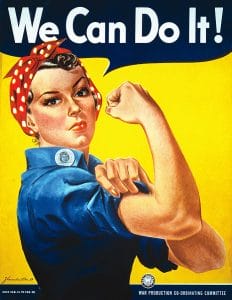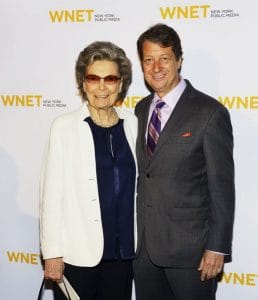Born Rosalind Palmer into a wealthy family (her father Carleton Palmer was president of drugmaker E.R. Squibb and Sons, her mother Winthrop Palmer was the first woman to serve as chair of the board of trustees of Long Island University), Walter was set for life. But when she graduated from an elite private high school, World War II was in full swing. She gave up the chance to go to Smith or Vassar Colleges, instead volunteering to work the night shift in a Connecticut war factory that made Corsair fighter planes. That attracted the attention of the Hearst newspaper chain’s columnist Igor Cassini, who wrote about women working in war factories using Walter as his example. That column, in turn, inspired songwriters Redd Evans and John Jacob Loeb to write a song about her, which was recorded by Kay Kyser and the Four Vagabonds; the latter recording was especially popular. The song: “Rosie the Riveter”.

The song, in turn, inspired artists. One was Norman Rockwell, who painted a stout woman in overalls eating from her lunchbox marked “Rosie”. Then, in 1942, the Westinghouse Company’s War Production Coordinating Committee hired Pittsburgh artist J. Howard Miller to create a series of posters to promote Westinghouse worker morale. One of these posters, titled “We Can Do It!”, celebrated women in the war effort workforce; it was meant only to be used briefly in the company’s own factories, and only about a thousand were printed. It was never called “Rosie the Riveter” when it was used, but it put a new face on that meme, in part because the Rockwell painting was copyrighted, and thus couldn’t be widely used. The Miller poster became what is now widely thought of as “the” Rosie. That artwork was inspired by a photo of Naomi Parker Fraley (Honorary Unsubscribe for 21 January 2018). The bottom line: there were many “Rosie the Riveters”, but Rosalind Walter, who actually was called Roz by her friends, was the first.

In 1951, Walter established a charitable foundation, which gave grants to numerous organizations over decades. Since she missed her chance at college, she was especially known for supporting public television. Walter was the largest individual contributor to WNET, the PBS station for the New York City area, bankrolling 67 specials or series. “She is one of those wonderful people that every nonprofit has to have,” said WNET’s president, Bill Baker, in 1994. “We get a lot of people who come up to the altar with great suggestions and then we have to scamper for the funds. But she is usually the closing dollars that get a program over the hump.” A lot of other organizations benefited as well, such as Chess in the Schools, the New York Historical Society, the International Tennis Hall of Fame, Planned Parenthood, and more. Rosalind Palmer Walter died at her Manhattan home on March 4, at 95.
See Also: Naomi Parker Fraley (2018) and Elinor Otto (2023).
